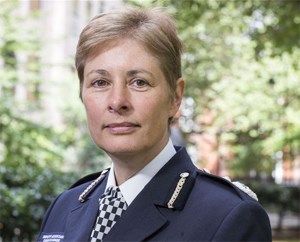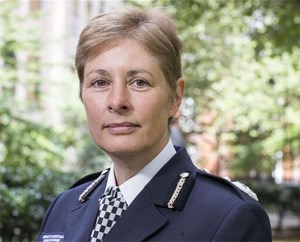22 Oct 2016
Reflections on ‘Look Outs’
A Blog from Deputy Assistant Commissioner Helen Ball as she leaves her post as Senior National Co-ordinator for Counter Terrorism Policing.
I was appointed to be the Senior National Co-ordinator for Counter Terrorism Policing in August 2013. This is a unique policing role, in which I have been responsible for co-ordinating the work of all UK Police Forces to help protect people from the dangers created by terrorists, violent extremists and radicalisers.
Protection is natural to me: I am the eldest of six children, four of whom are adopted and from different ethnic backgrounds. It feels as though I have looked out for and protected people all my life, and certainly this has been a major part of my policing vocation. The fact that early look outs – ‘the watch’ – grew into the police service we have today means that looking out for each other has always been at the centre of policing and explains why I have always felt at home in this extraordinary public service.
My time in role has coincided almost exactly with the rise of Daesh. As I look back over the past three years, I continue to admire the bravery and resolve of those who have been affected by Daesh’s evilness and of those who have worked to prevent the threat they pose from being realised. Whether we are the police, the security and intelligence agencies, or most importantly our strong communities, I am absolutely clear that all of us have so much more in common than we have differences, especially on the things that matter. We can, and do, look out for and protect each other.
A reflection of my time with counter terrorism policing can only start with the murderous attack plans in the UK that were prevented from becoming a terrible reality by the wonderful and brave interventions of communities, MI5, police, educators, and many others.
Let me take but a sample of these, evidenced by the convictions of the perpetrators.
Brusthon Ziamani (arrested in August 2014 and convicted in March 2015) planned to murder a member of the armed forces in a knife attack.
Tarik Hassane and Suhaib Majid (arrested in September 2014 and convicted in March 2016) planned to murder many police officers and / or members of the armed forces in a firearms attack on a police station or military base.
Nadir Syed (arrested in November 2014 and convicted in December 2015) planned to murder a person or people, probably at a Remembrance Parade, in a knife attack.
Mohammed Rehman and Sana Ahmed Khan (arrested in May and convicted in December 2015) planned to murder many people at a shopping centre or on the underground in a bomb attack.
Junead Khan and Shazib Khan (arrested in July 2015 and convicted in April 2016) planned to murder one or more US service-people using a car and knives outside a military base.
How many lives have been saved here in the UK because these attacks were prevented? If you count, conservatively, ten deaths for each of the firearms and bomb plots and one for each of the knife plots you reach twenty three. And these are only plots that have led to convictions, and only some of those. There are several other prevented UK plots, including some that can’t be publicly discussed; and at least one other where the plot was to murder people outside the UK.
Nobody should think, in describing these interventions, that I am ignoring or minimising the murders of hostages including two British citizens in Syria in 2014-15 or of thirty eight people including thirty British citizens in Tunisia in 2015, or the attempted murder by Mohammed Mire at Leytonstone tube station in 2015. These and other attacks have been the most significant sorrows of my time as SNC.
Other sorrows include the phenomenon of families and children deciding to travel to Syria to join Daesh, the way in which some people, especially young people and those with mental health problems, have been groomed and manipulated by radicalisers, including on line, and the increased use of propaganda and glorification of violence by terrorist groups.
I have seen propaganda used by those with extreme right wing views in a way that is intimidating and much closer to provocation, even incitement, than to free speech. And in Northern Ireland my colleagues and those they work with remain especially at risk, targeted for attack merely because of the jobs they do.
These sorrows accompany many significant joys of my time as SNC. Most of the joy comes from the clear evidence that communities want to look out for and protect each other.
Over the last two years, calls to the Anti-Terrorism Hotline (0800 789321) have been increasing year-on-year and over the last two years have risen from 10,580 to 12,450.
Referrals from the public highlighting online terrorist or extremist material have consistently risen, leading to the removal of deplorable material by the companies hosting it.
Referrals to Prevent from all sources have increased over the three years with over eleven thousand people referred between April 2015 and September 2016. During the same period 1,306 people benefited from support through Prevent.
In addition to these successes, I salute the women from all communities who have advised on and led community conversations under the Prevent Tragedies campaign to raise awareness of the risks that terrorists and violent extremists pose.
In 1829, Sir Robert Peel proposed the nine principles on which policing should be built – they remain the bedrock of British policing. The first principle states that “The basic mission for which the police exist is to prevent crime and disorder”. In the policing of terrorism and violent extremism, the importance of preventing crime cannot be overstated. It’s obvious that failure here leads to precious lives being diminished or destroyed or, at worst, lost.
Peel’s seventh principle declared that “Police, at all times, should maintain a relationship with the public that gives reality to the historic tradition that the police are the public and the public are the police; the police being only members of the public who are paid to give full-time attention to duties which are incumbent on every citizen in the interests of community welfare and existence”. The way in which police and our partners approach the prevention of terrorism and violent extremism, and the response of communities to these threats is fully in line with this tradition.
Fortunately, we have remarkable people working round the clock to counter terrorism and violent extremism and magnificent, resilient communities who know that reporting concerns is not being a busybody or a grass or interfering; it is protective. I have been honoured to look out for people and communities as the Senior National Co-ordinator for Counter Terrorism Policing. Let us all continue to be look outs for each other.
Contact information
Communications office
By phone: 0800 538 5058
By email: press.office@npcc.police.uk








